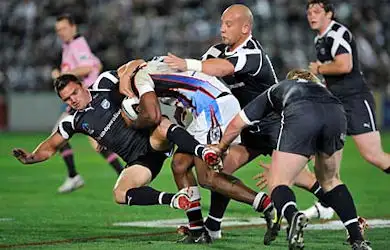Flower of Scotland or English Rose

International selection is often contentious. Eligibility can come via grandparents or through residency, and that means that any national side in soccer, cricket and union – as well as rugby league – can field players that, on the face of it, don’t belong to that country. That’s why Kevin Pietersen can become one of England’s best cricketers. That said, at least we can be fairly sure Pietersen isn’t going to change his mind and after the Cricket World Cup start playing Test matches for South Africa.
Danny Brough is an English player, who chose to represent Scotland in 2004, and captained his chosen country in the 2008 World Cup. This week he was selected to play for England instead.
There’s nothing wrong with Brough opting to play for Scotland – Brough qualifies via his Scottish grandfather. But many people seem to be finding his change of mind difficult to stomach. Not that he’s the first player to do this, but the decision has attracted criticism on a seemingly unprecedented scale. This might be because Brough first made known his desire to switch to England in February 2009, but still made two appearances for Scotland in last season’s European Cup.
This is where we need to examine the Rugby League International Federation (RLIF) rules for eligibility of players, according to their website: http://www.rlif.co.uk/about_rlif/laws_regulations
A player who is eligible to play for more than one country shall be entitled to elect for which country he wishes to play.
When a player plays a Senior International Match for a country, he is deemed to have elected to play for that country. Once an election is made the player may not play Senior representative rugby league for any other country until the end of the next World Cup tournament, or the expiry of two years, whichever is earlier (‘Election Period’).
That seems fairly straightforward. Brough elected to play for Scotland in autumn 2010; therefore he can’t play for England until autumn 2012. However, the RFL informed us that this was not the case:
3.1 A player is eligible to play an international match for:
(a) the country in which he was born;
(b) the country in which either of his parents or any of his grandparents were born
3.4 During an election period a player may change from one country to another for which he is eligible pursuant to Rule 3.1, with the approval of the Federation (but he may only change once in each election period).
This is a confusing mess, with the RLIF website telling us one thing and the RFL promising us that the RLIF website is wrong. If the RLIF were a real organisation and not just a cardboard cut-out of one, then maybe this sort of thing would be resolved.
As it stands we can only accept what the RFL says, while shaking our heads in utter disbelief at the ridiculous nature of it all. It’s no wonder that the international game isn’t taken seriously when players can simply change their minds about what country they belong to. If the RFL version of the rules is correct then the only barrier to Brough switching allegiances every couple of years is that he has to inform the RLIF – and as Richard Lewis is Deputy Chair of the RLIF, presumably that means Brough only has to pick up the phone to Red Hall and get Lewis’ secretary to pass on the message.
It’s Scotland that I feel sorry for, having lost one of their key players. You might argue that in a situation where a player could only choose one country then Scotland might never have had Brough anyway, as his ambitions always tended towards England. Nevertheless, such a situation would have two distinct advantages. The first is that any English-born players who did choose Scotland, Wales or Ireland would be truly committed to the cause. The second is that developing nations would have even greater incentive to develop their own players rather than relying on overseas players.
This blog has been full of criticism, so as a final note – the England Knights squad is a really good idea. The only problem is that they’re not guaranteed to play any fixtures. Perhaps they could play a game against Scotland – we could call it “The England Feeder Team Challenge”.
Keep Your Eye on Rugby League